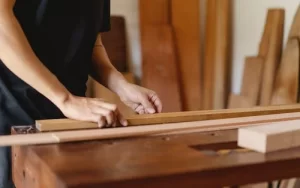

For any true and eager DIY enthusiast, make sure to choose beginner-friendly projects! However, you can still add a personal touch to make them truly unique. Here are a few tips to help you personalize your woodworking projects:
Look for the kind of wood that has unique grain patterns or colors to give your projects a one-of-a-kind look.
Try different stains, paints, or distressing techniques to achieve the desired aesthetic for your projects.
Consider incorporating decorative elements such as woodburning, inlay, or carving to add some stunning visual interest to your projects.
Make sure to adjust the dimensions of the projects to fit your specific needs or the space where they will be displayed.
Remember, woodworking is all about creativity and self-expression, so don’t be afraid to experiment and make each project your own.
As with any new skill, it’s natural to make mistakes along the way. Here are a few common mistakes to be aware of and avoid as a beginner in DIY woodworking:
Always double-check your measurements before making any cuts to ensure the pieces fit together properly.
Dull tools can lead to sloppy cuts and increase the risk of accidents. Make sure to keep your tools sharp and well-maintained.
Sanding is a crucial step in achieving a smooth and professional finish. Take the time to sand your projects properly.
Applying a finish too quickly or without proper preparation can result in a rather uneven or blotchy appearance. Hence, take your time and follow the instructions for the chosen finish.
Make sure to always prioritize safety when working with tools and machinery. Follow the manufacturer’s instructions and use protective gear.
By being aware of these common mistakes and taking the necessary precautions, you can ensure a more successful and enjoyable woodworking experience.
If you’re looking for further inspiration and learning opportunities in DIY woodworking, here are some resources to explore:
Websites such as YouTube and woodworking blogs offer a wealth of free tutorials and project ideas.
There are numerous books available that cover various woodworking techniques and provide project plans and inspiration.
You can also consider taking a local woodworking class or workshop to learn from experienced instructors and connect with other woodworking enthusiasts.
Join online forums or social media groups dedicated to woodworking to connect with fellow woodworkers, ask questions, and share your projects.
By immersing yourself in the woodworking community and continually seeking new knowledge, you can continue to grow and improve your woodworking skills.
Leave A Comment